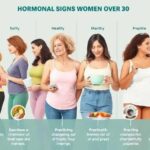Understanding Hormonal Changes in Women Over 30
The 30s is a transformative decade for many women, as the balance of hormones such as estrogen and progesterone begins to shift. These changes can manifest in various ways, affecting not only one’s physical health but emotional well-being as well. Women often encounter new challenges that require understanding and adaptation to maintain their health.
Hormonal fluctuations can lead to symptoms such as irregular menstrual cycles, mood swings, and fatigue. Such issues are frequently exacerbated by stress and lifestyle factors, making it crucial for women to adopt strategies that support hormonal health. Engaging in regular exercise, maintaining a balanced diet, and managing stress are foundational practices that can mitigate some of these effects.
The Role of Vitamin Deficiencies
See today's top solution for balance & energy
Gentle guidance trusted by our community.
As women age, certain vitamin deficiencies become more prominent, influencing overall health and hormonal balance. Deficiencies in crucial vitamins such as Vitamin D, B12, and calcium can contribute to fatigue, weakened bones, and even exacerbate mood disorders. These deficiencies can be subtle yet significantly impact the quality of life.
Ensuring adequate vitamin intake through diet or supplements can help counter these deficiencies. Foods rich in these vitamins, such as leafy greens, dairy products, and fortified cereals, can be incorporated into daily meals. Consulting with healthcare providers about personalized vitamin supplementation can also be beneficial.
Common Symptoms of Hormone and Vitamin Imbalance
Women over 30 often report symptoms such as chronic fatigue, unexplained weight gain, hair loss, and changes in skin texture. These can be signs that both hormonal imbalances and vitamin deficiencies are at play. It’s important to monitor these symptoms and seek professional advice if they persist.
Understanding one’s symptoms and how they relate to vitamin and hormone levels can guide lifestyle adjustments. For instance, improvements can be seen through increased physical activity, dietary changes, and stress-reducing practices. Recognizing the signs early can lead to interventions that improve health outcomes significantly.
Strategizing for Better Health
Addressing these health challenges requires a strategic approach that encompasses dietary adjustments, regular checkups, and possibly lifestyle shifts. An emphasis on nutritious foods rich in essential vitamins is a starting point for many. Additionally, adopting stress management techniques, such as yoga or meditation, can support overall well-being.
Introducing new health products can further supplement these efforts. Innovations in health supplements focusing on hormone regulation and vitamin enrichment offer promising avenues. Collaborating with healthcare professionals ensures that any new supplements or dietary changes are tailored to individual needs.
Community and Support Networks
Joining communities and support networks can enrich the management of health issues related to hormones and vitamins. These platforms offer a sense of belonging and an opportunity to share experiences and strategies that work. Online forums and local groups often provide a wealth of shared insights and resources.
Connecting with others who are navigating similar challenges helps build a support system that can be instrumental in maintaining motivation and promoting positive health behaviors. These communities can also be valuable sources of information about the latest trends and research in women’s health.
FAQ
How do hormonal changes affect mood?
Hormonal fluctuations can significantly impact mood levels, causing symptoms such as irritability, depression, or anxiety. These changes often relate to alterations in neurotransmitter functioning that are influenced by hormonal levels. Regular monitoring and strategies to maintain hormonal balance can help manage these mood swings.
What vitamins are crucial for women over 30?
Vitamins crucial for women over 30 include Vitamin D, B-complex vitamins, and calcium. These support bone health, energy levels, and overall vitality. Regular intake through diet or supplements is essential to prevent deficiencies that can lead to more severe health issues.
Can diet alone restore hormonal balance?
While diet plays a significant role in managing hormonal balance, it might not be sufficient for everyone. For some, dietary changes need to be complemented by lifestyle modifications such as exercise, stress management, and possibly hormonal treatments under medical guidance.
When should I consult a healthcare provider?
A healthcare provider should be consulted if you experience persistent symptoms such as severe mood swings, chronic fatigue, or any other unusual physical changes. Early consultation can help in diagnosing and managing symptoms before they lead to more significant health concerns.
How can community support help with health challenges?
Community support provides not just emotional backing but also practical advice from those experiencing similar health challenges. It offers a platform for sharing information, tips, and strategies that many find invaluable in managing their health effectively.
Watch the Video:
See today's top solution for balance & energy
Gentle guidance trusted by our community.






